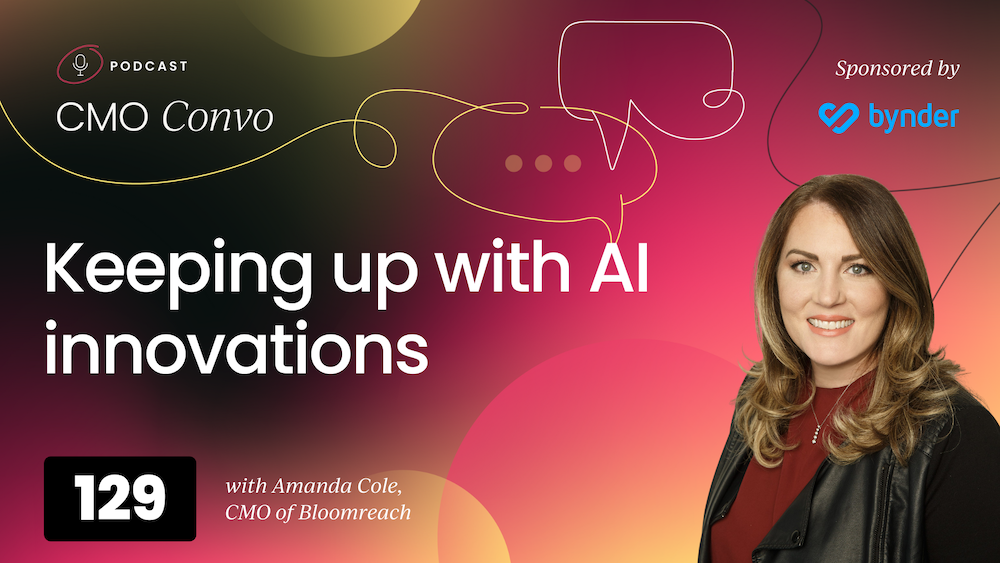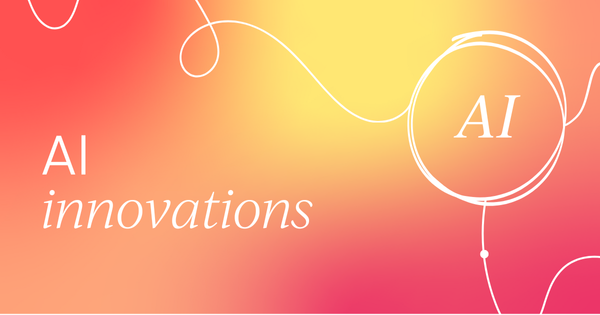Amidst the rapid advancements in artificial intelligence and the changes to data privacy, staying ahead in marketing requires a strategic and innovative approach.
I'm Amanda Cole, Chief Marketing Officer at Bloomreach, an AI-based company revolutionizing the e-commerce industry. With over two decades in B2B SaaS marketing, I've witnessed firsthand the transformative power of AI and the challenges it presents.
In this article, I'll delve into how CMOs can navigate AI innovations, manage ethical concerns, and balance the pressures from stakeholders.
Join me as I explore the future of marketing in an AI-driven world and provide practical strategies to stay ahead.
Prefer to listen? Check out Amanda's appearance on the CMO Convo podcast 👇

The pace of innovation in AI
At Bloomreach, our CTO published a study showing a 100-fold development in AI algorithms over a six-month period. This rapid development is ongoing because generative AI, a technology that has been around for a long time, is now evolving at an incredible pace.
Bloomreach started over 15 years ago with Google search engineers, and AI has been integral to our technology from the beginning. Today, AI is embedded in many technologies we use daily, from mobile phones to services like Uber.
Generative AI is unique because it creates rules and responses that it wasn't explicitly programmed to do. The fact that AI is learning and developing autonomously is what makes it so revolutionary. This self-improving capability is driving the rapid pace of innovation we're witnessing today.
As a CMO, it's essential to stay informed and adapt to the continuous advancements in AI. Engaging with the latest research, like the study published by our CTO, and understanding the broader implications of AI in your industry is crucial. Collaborating with other marketing leaders and AI experts can also provide valuable insights and strategies for navigating this rapidly changing landscape.
While the pace of AI innovation can be daunting, staying proactive, informed, and collaborative can help CMOs leverage AI's potential effectively.
Exponential growth and regulatory impacts
AI innovation is experiencing exponential growth, which is self-sustaining and somewhat concerning.
As a CMO, planning ahead becomes challenging when the pace of innovation constantly increases. Will there be a plateau, or will we continue to hold on for the ride?
Historically, innovation slows down when regulation comes into play. While many technology advancements have positive uses, such as medical research and data analysis, there are also bad actors. For example, AI has been misused for identity theft and deep fakes.
Regulatory measures are necessary to control the technology, but it's a complex process. Air Canada, for instance, had to honor a discount offered by an AI-generated response. Regulation will slow down innovation, but it will take time to catch up with the rapid pace of AI development.
As a CMO, the fundamental challenge remains the same: staying ahead of the competition and meeting consumer demands. However, the abundance of new tools adds complexity.
Marketers love tools and often believe that technology can solve any problem. But with hundreds of new AI tools emerging, it's difficult to ensure data security and functionality. Many AI startups are small, with just a few team members, raising concerns about their longevity and the inevitable market consolidation.
There's no easy answer, but scale is inevitable. We need to look at our current teams and anticipate significant growth. In B2B SaaS, we target 50% year-over-year growth. To achieve this, we must integrate technology that provides a competitive edge without necessarily adding headcount. AI tools can help with this, but the real differentiator will be our storytelling abilities.
Technology and automation are becoming more accessible, which means that simply having advanced technology will no longer set us apart. My career has been built on marketing technology, automation, and scale.
However, the future will require us to return to our storytelling roots. Connecting with our audience on an emotional level will be crucial.
Focusing on storytelling and audience connection, while acknowledging the evolving technology landscape, will help CMOs navigate the next 18 months of rapid AI innovation.

AI: Leveling the playing field for human creativity
I've heard discussions about AI freeing up time for creativity, but it's refreshing to think about it leveling the playing field for human creativity.
The idea that AI can make tech stacks more plug-and-play, reducing the time spent on maintenance, is quite compelling. This shift allows us to focus more on storytelling and creative aspects. At Bloomreach, we're actively working on integrating AI to enhance our creativity and efficiency.
Internally, we're leveraging a startup called Character Quill to free up our creative thinking. Traditionally, persona research involved developing surveys, gathering client data, creating questionnaires, conducting interviews (at a significant cost per interview), and then analyzing the data to find insights and develop a narrative. This process was time-consuming and resource-intensive.
Character Quill automates this entire process. AI can ingest and analyze data in milliseconds, something that would take a human team weeks or even months. The AI captures data, executes surveys, records interviews, and crunches the information to provide insights, quotes, messaging, and positioning analysis in just a few days. This speed allows us to pivot our marketing strategies quickly and impact the market faster.
Character Quill is a fantastic tool because it drastically reduces the time to value, allowing us to quickly gain valuable insights and produce results beneficial to the company. It's not just about churning out content but driving efficiency in backend processes that are time-consuming and costly.
Tools like Character Quill streamline persona research, data collection, and analysis, significantly speeding up the process. This efficiency enables us to shift our focus to creative storytelling faster.

On the B2C side, Bloomreach helps clients manage their paid advertising efficiently. For example, if you're running paid ads for an e-commerce company and you return from vacation, AI can analyze the performance of your ads during your absence.
It can also detect changes in the macro environment and adjust trends and keywords accordingly. Instead of spending time gathering insights, you return with actionable recommendations from AI, allowing you to make immediate adjustments.
Experiences fuel creativity. People who live enriched lives bring diverse perspectives and ideas to the table, which is crucial for innovation. AI can level the playing field by making technology more accessible, but creativity will remain the key differentiator. The challenge for CMOs is to invest wisely in AI tools, especially with reduced marketing budgets and a rapidly changing tech landscape.
Investing in AI amid rapid change
CMOs aren't alone in facing challenges with AI. CFOs and other departments are also exploring how AI can improve their operations. For example, AI helps in finance by automating vendor onboarding and invoice verification. Every team in the organization is impacted by AI, creating a baseline understanding of its potential.
Testing new AI tools has always been part of the CMO role. Many AI companies offer free trials and month-to-month contracts, allowing us to experiment without significant upfront investment.
We have a team member dedicated to exploring AI tools and even coding with AI to create integrations and automate processes. For instance, he developed a Slack integration that provides detailed research about leads, significantly enhancing our team's efficiency.
It's important to partner with established vendors like HubSpot, which are integrating AI into their platforms and seeking beta testers. Emerging companies like Clary and Clay, backed by experienced founders and strong VCs, also offer promising solutions. Understanding the people behind these technologies and their long-term viability is crucial.
Investing in AI requires a willingness to accept tools that may not be perfect initially but have the potential to evolve significantly. Having a dedicated team member to tinker with and evaluate these tools helps us stay ahead. Focusing on tools that show promise and have robust backing means we can make informed decisions and leverage AI to enhance our marketing strategies.
While AI presents numerous opportunities and challenges, thoughtful investment and a focus on creativity can help CMOs navigate this rapidly changing landscape effectively.

Company-wide approach to AI experimentation
Aligning company-wide resources for AI experimentation can be highly effective. At Bloomreach, we have a somewhat organic approach to this alignment. As an AI company, innovation is inherently part of our culture, but the alignment still requires strategic communication and agreement among the C-suite members.
In other industries, particularly those with strict data privacy regulations like healthcare, CMOs may face more restrictions. The key is to help the executive team understand the competitive landscape and the potential risks of not innovating.
Conducting thorough research and presenting insights on market trends and competitor activities can help build a compelling case for embracing AI experimentation.
Our IT team, for instance, is cautious due to the nature of our products, which ingest and personalize customer data. Their concerns about data privacy and potential brand reputation issues are valid.
Acknowledging these fears and providing safe ways to innovate is essential. Balancing innovation with security requires continuous communication and education within the organization.
Having an in-house AI expert is invaluable. This individual not only guides the executive team but also plays a crucial role in educating and empowering the rest of the team. Our AI expert, for example, manages the overall AI strategy and ensures that it aligns with our business goals.
Our team is naturally tech-savvy and eager to explore new tools. While anyone can experiment with AI tools, we have strict policies about connecting these tools to real data or systems to prevent any potential risks.
Our CTO, with a background at Nvidia and extensive experience in AI, leads bi-weekly open forum Q&A sessions. These sessions provide a platform for all employees, including those in marketing, to ask questions, discuss ideas, and gain insights from our AI engineering teams.

Data protection
Data protection is a significant concern when integrating AI tools, especially when handling customer data. We must be vigilant about the systems we connect to AI and ensure that our data privacy measures are robust. Any misstep could lead to data leaks and damage our brand reputation.
To address these concerns, we prioritize safe innovation. Our approach includes thorough vetting of AI tools and continuous monitoring of their performance and security. By fostering a culture of responsible innovation and maintaining open lines of communication across all departments, we can effectively integrate AI while safeguarding our data.
Integrating AI into our marketing and overall business strategy requires a delicate balance of innovation and caution. By aligning resources, fostering a culture of continuous learning, and prioritizing data protection, we can leverage AI to its fullest potential. The involvement of knowledgeable experts and a collaborative approach across the organization are key to navigating the complexities of AI integration successfully.
Experimentation at scale: The creative AI lab
At Bloomreach, we foster a culture of experimentation at scale, which allows us to discover innovative solutions. By encouraging diverse team members to try different things, we often find unexpected results. This kind of environment helps drive innovation not only in creative outputs but also in processes, freeing up time from repetitive tasks and allowing for greater focus on impactful work.
One area I'm particularly excited about is AI's ability to streamline contracting processes.
Traditionally, getting a contract through legal and signed is time-consuming. AI can evaluate contract language, highlight discrepancies, and focus legal review on the most critical areas. This efficiency reduces the time spent on non-creative tasks, enabling marketers to focus on more strategic activities.

Similarly, AI can assist with budget management and other administrative tasks that don't directly create value but are necessary for value creation. Automating these processes can dramatically enhance productivity and overall team satisfaction.
Marketers enter the industry for creative work, not to manage budgets or legal contracts. Leveraging AI to handle these routine tasks allows our teams to focus on what they do best —creating compelling content and strategies. This shift not only improves job satisfaction but also drives better business outcomes.
When selecting AI technology partners, it's crucial to consider several key factors:
- People behind the company: Focus on the founders and their commitment to partnership. Understanding their vision and dedication is vital.
- Unique problem solving or scale creation: The technology should either address a unique problem or provide significant scalability. For example, Character Quill not only scales the voice of the customer data ingestion but also automates it seamlessly.
- Pace of innovation: Ensure the company is continuously innovating and not stagnant. They should demonstrate a commitment to ongoing development and improvement.
- Funding and financial stability: The company should have strong financial backing or substantial funds in reserve. This financial health indicates their ability to sustain and scale their innovations.
- Investor confidence: Evaluate the investors backing the company. Understanding why investors have placed their bets can provide insights into the company’s potential. Be wary if investors have made multiple similar bets, as this may indicate uncertainty rather than confidence.
Transparency is crucial in these partnerships. Companies unwilling to share detailed information for due diligence might not be the best partners.
Having been in SaaS for two decades, I've seen how leadership quality and company culture impact technology quality and customer relationships. Ensuring a cultural fit and alignment in values is always at the top of my list when choosing technology partners.
Embracing AI in marketing requires a strategic approach, focusing on partners who bring value, innovation, and a commitment to continuous improvement. Leveraging AI to handle routine tasks means we can free up our teams to focus on creativity and strategic initiatives, ultimately driving better results for the company.
Navigating ethical and moral challenges in AI
As AI accelerates, so do concerns around data privacy, ethics, intellectual property, and the rights of individuals.
CMOs need to stay informed to ensure they navigate AI development and implementation ethically.
An old mentor of mine once said, "If it’s right for the customer, and it’s right for the company, then it’s the right thing to do." This framework can guide us through ethical decision-making.
For instance, if getting a product to customers faster benefits them and the company but creates sustainability issues and operational stress, it’s not the right thing to do despite immediate gains. Evaluating decisions through this lens helps balance innovation with responsibility.
Despite best efforts, some will misuse AI to exploit gaps in regulation. Being hyper-aware and cautious about new technologies and their creators is crucial. Until regulations catch up, it’s essential to remain vigilant and conduct thorough validations to ensure partnerships with ethical companies.
At Bloomreach, we’ve established clear AI principles to guide our experimentation:
- AI tools cannot be connected to live systems during testing.
- We strictly prohibit the use of actual customer data in experiments.
- Confidential information cannot be connected to AI tools.
We use sandbox environments and spreadsheet uploads for testing, ensuring that no sensitive data is exposed. Additionally, we’ve conducted security training for all employees to reinforce these guidelines.
Setting up sandbox environments is part of our business as usual, especially in SaaS. It involves a necessary but manageable delay to ensure safety.
For companies with fewer resources or less tech-driven environments, partnering with agencies or vendors that specialize in creating secure testing environments can be a practical solution. These partners can help anonymize data and set up necessary systems for production-level testing without compromising sensitive information.
Navigating the ethical landscape of AI requires a balance of innovation and caution. By following ethical frameworks, establishing clear internal guidelines, and utilizing external expertise when necessary, CMOs can ensure they leverage AI responsibly and effectively.
Addressing job security concerns
The rapid advancement of AI, such as ChatGPT and other generative AI tools, has raised concerns about job security in the marketing industry.
While Bloomreach employees might be more inclined to embrace AI, these concerns are valid across various sectors. As CMOs, we have a responsibility to address these worries and ensure the well-being and career longevity of our teams.
AI operates by building mathematical associations between words, without truly understanding the context or meaning. Humans, on the other hand, bring a unique combination of sensory experiences and contextual understanding.
For example, when we think of the word "orange," it could refer to a fruit, a color, or a flavor, among other things. This depth of understanding and ability to generate ideas is something AI cannot replicate.
Marketing will continue to thrive because of this human creativity. AI can speed up processes, but it cannot replace the nuanced and imaginative aspects of marketing.
Tasks like event planning, building customer relationships, and creating compelling narratives require human touch and intuition. AI can assist by handling repetitive tasks, freeing up more time for marketers to focus on strategic and creative work.

When ChatGPT first launched, there was widespread fear that it would render roles like copywriting obsolete. However, as we've integrated these tools, it has become clear that AI is a complement rather than a replacement. The efficiency gains from AI mean marketers can spend less time on mundane tasks and more on strategic initiatives.
The concern about needing fewer marketers due to AI efficiencies is understandable. However, I believe AI will not shrink the industry but rather transform it. Entry-level marketers will still need to learn the fundamentals of good copy and design.
AI can accelerate this learning process by providing immediate feedback on what resonates with audiences, allowing new marketers to iterate and improve quickly.
For instance, traditionally, learning what makes effective ad copy involved running tests, analyzing results, and iterating over weeks or months. With AI, this process is expedited. Tools like Upside allow us to test multiple ad copies and get immediate feedback, shortening the learning curve for new marketers.
Even as AI generates suggestions, human oversight is crucial. Experienced marketers will still need to guide AI, tweak its outputs, and ensure the quality and relevance of the content. This mentorship ensures that the principles of effective marketing are passed onto the next generation.
AI's impact extends beyond job security to include concerns about data privacy, ethics, and intellectual property. CMOs must stay informed about these issues to ensure their use of AI aligns with ethical standards. At Bloomreach, we have established clear AI principles, prohibiting the use of live systems, customer data, or confidential information for experimentation. This cautious approach helps protect sensitive data and maintain trust.
For smaller companies or those less tech-driven, setting up secure environments for AI experimentation can be challenging.

Partnering with agencies or vendors specializing in creating sandbox environments can be a practical solution. These partners can help anonymize data and set up secure systems for testing AI tools, ensuring smaller companies can leverage AI without compromising security.
AI presents both challenges and opportunities for the marketing industry. Leveraging AI to handle routine tasks means we can enhance creativity and strategic focus. Ensuring ethical use, fostering continuous learning, and maintaining a human-centric approach will allow us to harness AI's potential while safeguarding job security and upholding marketing principles.
Managing pressure and aligning AI with business goals
As CMOs, dealing with pressure from stakeholders to adopt AI can be challenging, especially when driven by media hype or executive enthusiasm. At Bloomreach, we're fortunate to have alignment at the executive level, but this isn't always the case for everyone.
When your CEO reads about the latest AI trends and wants immediate implementation, it's crucial to manage these expectations strategically:
- Find the big win: Identify a significant area where AI can provide a tangible benefit. Interview key stakeholders —your CEO, CFO, and CRO— to understand where marketing is seen as slow, inefficient, or lacking support. Focus your AI efforts on this area to achieve a noticeable win.
- Catalyze your team: Concentrate on one impactful project to demonstrate AI's potential without overwhelming your team. This approach can build credibility and show the executive team that AI can transform business outcomes effectively.
AI integration should be thoughtful and aligned with business goals. Here are some golden rules and takeaways for CMOs to consider when navigating AI innovation:
- Be curious: Stay informed and curious about AI developments. Engage with industry experts, attend conferences, and continually educate yourself on new technologies.
- Build a network: Connect with other professionals interested in AI. Use platforms like LinkedIn to reach out to peers and thought leaders. Collaboration and sharing insights can provide valuable perspectives and solutions.
- Focus on transformation: Aim for transformative projects rather than minor improvements. Identify areas where AI can significantly impact and drive substantial change within your organization.
AI offers vast potential for marketing, but it requires a strategic and cautious approach. CMOs can effectively leverage AI to drive business success by finding significant opportunities, fostering team support, and focusing on transformative projects. Stay curious, build a robust network, and always aim for impactful changes. These principles will help you navigate the rapidly evolving landscape of AI in marketing.
Enjoyed these insights? Why not check out the full unedited talk right here?



 Follow us on LinkedIn
Follow us on LinkedIn




